Connecticut College
Connecticut College (Conn) is a private liberal arts college in New London, Connecticut. Originally chartered as Thames College, it was founded in 1911 as the state's only women's college, a response to Wesleyan University having closed its doors to female students in 1909. The college became coeducational in 1969, adopting its current name.
 | |
Former names | Thames College (1911)[1] Connecticut College for Women (1911–1969)[2] |
|---|---|
| Motto | Tanquam lignum quod plantatum est secus decursus aquarum |
Motto in English | |
| Type | Private liberal arts college |
| Established | April 1911 |
Academic affiliation | |
| Endowment | $435 million (2022)[3] |
| President | Leslie Wong (interim) |
Academic staff | 246 |
| Undergraduates | 1,737[4] |
| Location | , , United States 41°22′42.36″N 72°06′16.81″W |
| Campus | Suburban, 750 acres (303 ha)[5] |
| Colors | Connecticut College blue and white[6] |
Sporting affiliations | |
| Mascot | Camel |
| Website | www |
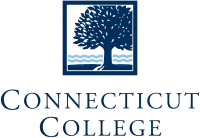 | |
Conn is a four-year residential undergraduate institution with approximately 1,700 students. Students choose courses from 41 programs, including interdisciplinary pathways and centers, with a majority choosing to study abroad. The college is situated on a hill located adjacent to the Thames River. In 1982, Conn was inducted as a member of the New England Small College Athletic Conference (NESCAC), where its athletes compete as part of NCAA Division III.
History
Connecticut College was chartered in 1911 as Connecticut's only women's college, having been established as a direct response to Wesleyan University's decision to stop admitting women.[7][8] Elizabeth C. Wright and other Wesleyan alumnae convinced others to found this new college, espousing the increasing desire among women for higher education.[9][10] To that end, the institution was founded as the Connecticut College for Women. Their initial endowment came from financial assistance from the city of New London and its residents, along with a number of wealthy benefactors. The college sits on a former dairy farm owned by Charles P. Alexander of Waterford. He died in 1904 and his wife Harriet (Jerome) Alexander died in 1911. Their son Frank sold a large part of the land to the trustees to found Connecticut College.[11]
The Hartford Daily Times ran an article on October 12, 1935, marking the college's 20th anniversary: "On September 27, 1915, the college opened its doors to students. The entering class was made up of 99 freshmen students, candidates for degrees, and 52 special students, a total registration of 151. A fine faculty of 23 members had been engaged and a library of 6,000 volumes had been gathered together." The college became co-educational in 1969, as President Charles E. Shain claimed that there was evidence that women were becoming uninterested in attending women's colleges.[12] At that time, the school adopted its current name, Connecticut College.
In 2023, students, faculty, and staff began protesting against college president Katherine Bergeron who had been in office for nearly a decade. The protests focused on allegations of bullying and actions related to diversity and equity, most notably a decision to hold a college fundraising dinner at the Everglades Club, a social club and venue that has longstanding accusations of discrimination against Black and Jewish people. Students occupied the administrative building, senior staff publicly resigned, and faculty voted no confidence in her. In late March, she bowed to this pressure and announced her resignation effective at the end of the spring semester.[13] On July 1, 2023, Leslie Wong began service as interim president of the college.[14]
Campus
The main campus has three residential areas. The North Campus contains the newest residential halls. The South Campus contains residence halls along the west side of Tempel Green, across from several academic buildings. The oldest dorms on campus are Plant House and Blackstone House, which were founded in 1914.[15][16] The campus houses the Winslow Ames House.
Connecticut College's two principal libraries are the Charles E. Shain Library and the Greer Music Library, which is located in the Cummings Arts Center. The Shain Library houses a collection of more than 500,000 books and periodicals and an extensive collection of electronic resources. It is also home to The Linda Lear Center for Special Collections and Archives, and to the Charles Chu Asian Art Reading Room.[17] The Lear Center has more than fifty book, manuscript, and art collections including research archives devoted to Rachel Carson, Eugene O'Neill, and Beatrix Potter.[18] The Charles Chu Asian Art Reading Room serves both as a quiet reading area and as the permanent exhibition space for the Chu-Griffis Art Collection.[19]
The student center is "The College Center at Crozier-Williams" (often shortened to "Cro"), and is located in the middle of the campus. The student center houses the Connecticut College bookstore (which doubles as a small convenience store), the campus post office, the Oasis Snack Shop, and the campus bar, Humphrey's (formerly The Cro Bar). There are also student services offices as well as faculty offices and performance spaces for the Dance department.

The Charles E. Shain Library was originally dedicated in 1976 and is named after former College President Charles Shain. It was renovated, expanded, and re-dedicated in 2015. The renovation was honored by the American Institute of Architects with a 2015 New England Honor Award in the category of Preservation.[20] In 2016, LibraryJournal named the library a New Landmark Libraries Winner.[21]
Performance spaces on campus include: Palmer Auditorium, Tansill Theater, housed in Hillyer Hall; Myers Dance Studio,[22] housed in Crozier-Williams College Center; Harkness Chapel, Evans Music Hall, Fortune Recital Hall; Oliva Hall, housed in Cummings Art Center.[23]
Palmer Auditorium was home to the American Dance Festival from 1947 to 1977, featuring choreographers such as Martha Graham, José Limón, and Merce Cunningham in what was called "the most important summertime event in modern dance."[24][25]
The Connecticut College Arboretum is an arboretum and botanical garden. The arboretum is also open to the public.
Harkness Chapel was designed by architect James Gamble Rogers, exhibiting his colonial Georgian style, with twelve stained glass windows by G. Owen Bonawit. The building is used for denominational religious services, as well as for ceremonies, concerts and recitals, weddings, and other public functions.[26]
The Lyman Allyn Art Museum is located on campus, although it is not connected to the campus proper. The museum's website states that "the permanent collection includes over 10,000 paintings, sculpture, drawings, prints, furniture, and decorative arts, with an emphasis on American art from the 18th through 20th centuries." The collection is housed in a neo-classical building designed by Charles A. Platt.[27]
Academics
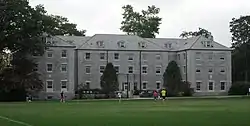
Connecticut College is accredited by the New England Commission of Higher Education; it has been so continuously by NECHE or its predecessor since December 1932.[28] The college's academics are organized into thirty-one academic departments and seven interdisciplinary programs with forty-one traditional majors plus opportunities for self-designed courses of study. Starting with the class of 2020, students at Connecticut Collegeparticipate in a new interdisciplinary general education curriculum called Connections.[29][30]
Its most popular majors, by 2021 graduates, were:[31] Psychology (44), Economics (36), Political Science & Government (34), Biology/Biological Sciences (27), and Neuroscience (22).
Connecticut College has a history of undergraduate research work and students are encouraged to make conference presentations and publish their work under the guidance of a professor.[32] The college had 182 full-time professors in 2017–18; 93% held a doctorate or equivalent. The student-faculty ratio is about 9 to 1.[33]
Admissions
Admission to the college is considered "more selective" by U.S. News & World Report.[34] The college received 6,784 applications for the Class of 2023 (entering fall 2019) of which 2,538 (37.4%) were accepted. Of the 68% of the entering class who submitted SAT scores, the middle 50% range was 650–710 for evidence-based reading, and 660–740 for Math.[35]
Rankings
| Academic rankings | |
|---|---|
| Liberal arts colleges | |
| U.S. News & World Report[36] | 46 |
| Washington Monthly[37] | 25 |
| National | |
| Forbes[38] | 128 |
| THE / WSJ[39] | 103 |
In the 2022 college rankings of U.S. News & World Report, Connecticut College ranked 55th (tie) among liberal arts colleges, 63rd (tie) for "Best Undergraduate Teaching", 40th (tie) for "Most Innovative", 69th for "Best Value", and 144th for "Top Performers in Social Mobility".[34]
Washington Monthly ranked Connecticut College 25th in 2021 among 218 liberal arts colleges in the US based on its contribution to the public good, as measured by social mobility, research, and promoting public service.[40] Forbes ranked Connecticut College 128th overall in its 2019 list of 650 liberal arts colleges, universities and service academies; 55th among liberal arts schools, 62nd in the Northeast, and 96th among private colleges.[41] Connecticut College is accredited by the New England Commission of Higher Education.[42]
Student life
Honor code
Students live under the college's 85-year-old student-adjudicated honor code. The honor code underpins all academic and social interactions at the college and creates a palpable spirit of trust and cooperation between students and faculty. Other manifestations of the code include self-scheduled, non-proctored final exams.[43][44]
Demographics
In a typical year, the college enrolls about 1,850 men and women from 40 to 45 states, Washington, D.C., and 70 countries. Approximately forty percent of students are men. The fall 2019 student body was 67.5% White, 9.9% Hispanic, 4.1% Asian American, 3.8% African American, and 3.7% multiracial, with an additional 9% international students.[45] The college is now particularly known for interdisciplinary studies, international programs and study abroad, funded internships, student-faculty research, service learning, and shared governance. Under the college's system of shared governance, faculty, staff, students, and administrators are represented on the major committees that make policy regarding the curriculum, the budget, and the campus and facilities.
Memberships
Connecticut College is a member of Phi Beta Kappa, the Annapolis Group, and the New England Small College Athletic Conference (NESCAC).
Clubs and organizations
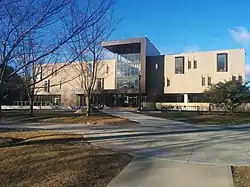
Connecticut College does not offer a Greek system of fraternities or sororities. The college has seven a cappella groups. Women's groups are The ConnChords, The Shwiffs, and Miss Connduct. The Co Co Beaux is the male group. The coeducational groups include the ConnArtists, Vox Cameli, and the Williams Street Mix.[46]
Composer and violinist Margaret Jones Wiles founded and conducted the Connecticut College Orchestra when she taught at the college during the 1950s.
The college radio station (WCNI 90.9 FM) broadcasts a variety of music, including polka, blues, and Celtic music shows. A 2,000 watt transmitter installed in 2003 reaches much of the lower New England region.[47] Connecticut College has two student newspapers in which students handle all aspects of production: reporting, editing, ad sales, management, photography, layout, multimedia, and design. The College Voice[48] is an editorially independent print and online bi-weekly publication,[49] and The Conntrarian[50] is an online opinion publication and a member of the Collegiate Network.[51]
The Student Activities Council (SAC) runs events including club fairs, school dances, concerts, and off-campus excursions.[52] SAC is also responsible for Floralia, the annual spring concert. Recent Floralia artists have included Misterwives, Cash Cash,[53] RAC, and St. Lucia.[54]
Unity House is the college's multicultural center which promotes, supports, educates, and implements multicultural awareness programs on campus.[55] It supports various affinity, activist, and performance student groups.[56] The Women's Center provides a space for programming and events concerning gender issues.[57] The LGBTQIA Resource Center serves queer students and their allies by providing a supportive space, resource library, social events, and educational programming. It also hosts several student organizations.[58] In August 2013, Campus Pride named Connecticut College one of the top 25 LGBT-friendly colleges and universities.[59]
Athletics
The College's teams participate as a member of the National Collegiate Athletic Association's Division III in the New England Small College Athletic Conference (NESCAC). There are a total of 28 varsity athletics teams at Conn. The twelve men's sports include basketball, cross country, ice hockey, lacrosse, rowing, soccer, squash, swimming and diving, tennis, track and field, and water polo. The fifteen women's sports consist of basketball, cross country, field hockey, ice hockey, lacrosse, rowing, sailing, soccer, squash, swimming and diving, tennis, track and field, volleyball, and water polo.
In 2014, the women's soccer team won the College's first and only NESCAC Championship to date, defeating Williams College in penalty kicks.
On December 4, 2021, the men's soccer team won the College's first-ever NCAA Division III National Championship by defeating Amherst College in penalty kicks. Earlier in the season, the team won its first NESCAC regular season title.[60]
On January 21, 2021, Connecticut College goalkeeper AJ Marcucci was selected 67th overall in the 2021 MLS SuperDraft by New York Red Bulls. He became the first-ever draft pick from Connecticut College and was the first Division III pick since 2016.
The Connecticut College Women’s Water Polo Team has won four Collegiate Water Polo Association Division III championships.
Connecticut College has produced 427 collegiate All-Americans, sixty Academic All-Americans and twelve Olympic qualifiers.
The Connecticut College Athletics Hall of Fame was established in 1989 and currently has over 100 inductees.
Notable alumni
Connecticut College graduates of note include Bloomberg Businessweek senior national correspondent Joshua Green, AOL CEO Tim Armstrong, New York Times best-selling authors Sloane Crosley, Hannah Tinti and David Grann, Academy Award-winning actress Estelle Parsons, fashion designer Peter Som, National Baseball Hall of Fame director Jeff Idelson, philanthropist Nan Kempner, Beyond Meat founder Ethan Brown, Senior Federal District Judge Kimba Wood and American Olympic rower Anita DeFrantz.
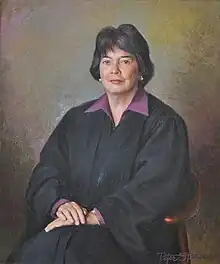
.jpg.webp)
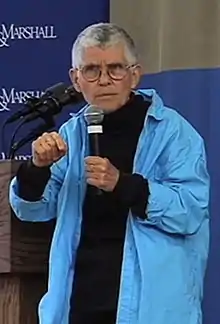 Cynthia Enloe,
Cynthia Enloe,
Political theorist and feminist writer
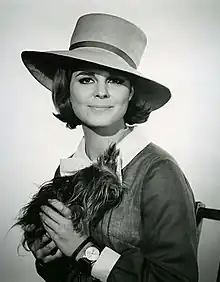
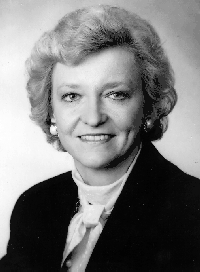
.jpg.webp)
References
- "Traditions". conncoll.edu. Connecticut College. Retrieved 1 February 2023.
- "A History of Connecticut College: Opening Day, 1915". conncoll.edu. Connecticut College. Retrieved 1 February 2023.
- "2022 Progress Report". Connecticut College. Retrieved 2023-04-19.
- "Connecticut College". Carnegie Classification of Institutions of Higher Education. Retrieved 2023-04-19.
- "Connecticut College". U.S. News & World Report Best Colleges Ranking. Retrieved 19 April 2023.
...the campus size is 750 acres.
- https://www.conncoll.edu/media/website-media/visualidentity/VisualIDManual.pdf
- "History of Wesleyan University". Wesleyan.edu. Archived from the original on 2009-03-30. Retrieved 2011-06-16.
- "Connecticut College: Centennial video generates excitement". Conncoll.edu. 2011-01-19. Archived from the original on 2012-03-05. Retrieved 2011-06-16.
- "Connecticut College: Centennial News: A History of Connecticut College: New London Raises $100,000". Conncoll.edu. Archived from the original on 2012-12-01. Retrieved 2011-06-16.
- "Connecticut College: Centennial News: The founding of Connecticut College". Conncoll.edu. 2011-01-05. Archived from the original on 2012-12-01. Retrieved 2011-06-16.
- "A Modern History of New London County, Connecticut;, Volume 3, Page 163 | Document Viewer". Mocavo.com. 2013-05-03. Retrieved 2014-08-17.
- "Connecticut College Goes Fully Co-Ed"
- Moody, Josh (March 27, 2023). "Connecticut College President Resigns Under Pressure". Inside Higher Ed. Retrieved March 27, 2023.
- "Board of Trustees Selects Interim President". Connecticut College. Retrieved 2023-07-10.
- "Blackstone House" on the Connecticut College website
- "Plant House" on the Connecticut College website
- "Libraries, Collections & Services". Connecticut College. Retrieved 24 March 2016.
- "Linda Lear Center for Special Collections and Archives". Connecticut College. Retrieved 24 March 2016.
- "Charles Chu Asian Art Reading Room". Connecticut College. Retrieved 24 March 2016.
- "AIA New England 2015 Design Awards". AIAConnecticut. Archived from the original on 2016-03-29. Retrieved 31 March 2016.
- "Charles E. Shain Library New Landmark Libraries 2016 Winner". LibraryJournal. Retrieved 19 September 2016.
- "Performance Spaces". Connecticut College. Retrieved 2018-01-31.
- "Performance Spaces" on the Connecticut College website
- "American Dance Festival History"
- ""Eighth Sister No More": The Origins and Evolution of Connecticut College by Paul P. Marthers p. 163
- "Reserving Harkness Chapel". Connecticut College. Archived from the original on July 23, 2014. Retrieved July 19, 2014.
- "Lyman Allyn Art Museum, New London, Connecticut". Lyman Allyn Art Museum. Retrieved July 19, 2014.
- "Accreditation".
- title=Connecticut College Connections homepage
- "Connecticut College revamps gen ed". Retrieved 2016-12-15.
- "Connecticut College". nces.ed.gov. U.S. Dept of Education. Retrieved February 3, 2023.
- Connecticut College. "Connecticut College Internships and Student Research". Archived from the original on October 23, 2012. Retrieved November 7, 2012.
- "About us" on the Connecticut College website
- "Connecticut College Rankings". U.S. News & World Report. 2020.
- "Admission data for the Class of 2023". Connecticut College. Retrieved May 14, 2020.
- "Best Colleges 2024: National Liberal Arts Colleges". U.S. News & World Report. Retrieved September 20, 2023.
- "2023 Liberal Arts Rankings". Washington Monthly. Retrieved September 25, 2023.
- "Forbes America's Top Colleges List 2023". Forbes. Retrieved September 22, 2023.
- "Wall Street Journal/Times Higher Education College Rankings 2022". The Wall Street Journal/Times Higher Education. Retrieved July 26, 2022.
- "2021 Liberal Arts Colleges Ranking". Washington Monthly. Retrieved 2023-04-30.
- "America's Top Colleges: Connecticut College". Forbes. August 15, 2019.
- Connecticut Institutions – NECHE, New England Commission of Higher Education, retrieved May 26, 2021
- "Self-Scheduled Exams" on the Connecticut College website
- "Honor Code" on the Connecticut College website
- "Diversity Demographics" (PDF). Connecticut College. Retrieved 3 February 2020.
- "Clubs & Organizations" on the Connecticut College website
- "WCNI - FM 90.9 - New London, CT" on Streema
- "The College Voice". The College Voice. Retrieved 2017-08-07.
- "About" on The College Voice website
- "The Conntrarian". The Conntrarian. Retrieved 2022-08-08.
- "About" on The Conntrarian website
- "Clubs and Organizations | Governance on the Connecticut College website
- "Rocking the Dot" from The College Voice
- Floralia: A Recent History Memories of the Past and Upcoming Excitement from The College Voice
- "Unity House" Archived 2016-04-09 at the Wayback Machine on the Connecticut College website
- "Unity-Affiliated Student Clubs" Archived 2016-04-09 at the Wayback Machine on the Connecticut College website
- "The Women's Center". conncoll.edu. Archived from the original on 2013-12-11.
- "LGBTQ Resource Center" Archived 2016-03-24 at the Wayback Machine on the Connecticut College website
- Campus Pride Releases 2013 ‘Top 25 LGBT-Friendly Universities And Colleges' Listing Unity House and the LGBTQIA Center are both staffed by full-time staff members.
- "Connecticut College wins the 2021 DIII men's soccer championship | NCAA.com". www.ncaa.com. Retrieved 2022-04-04.